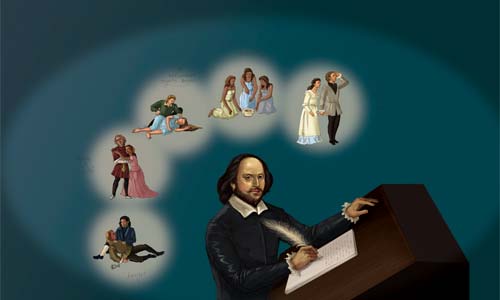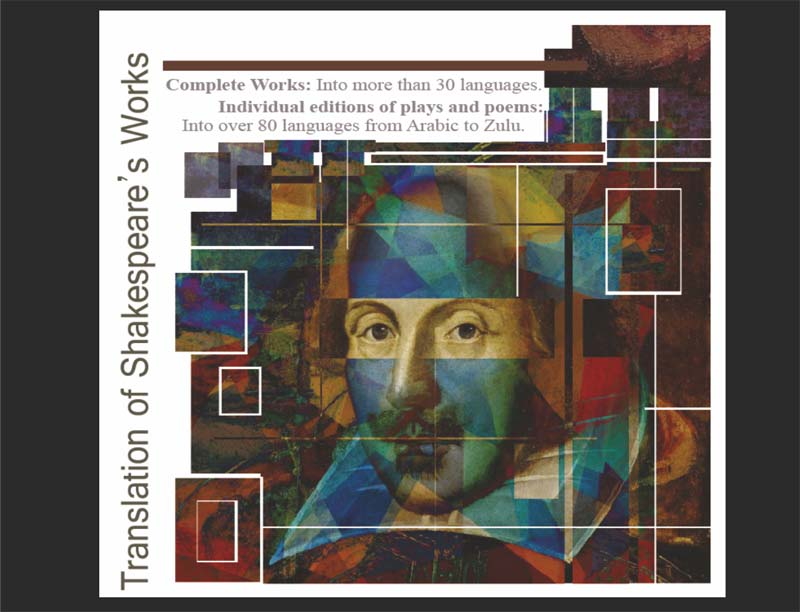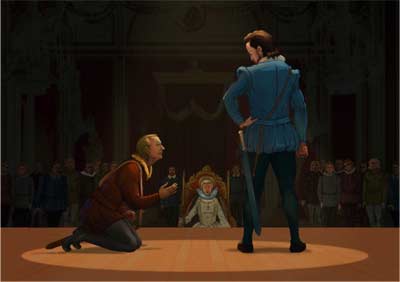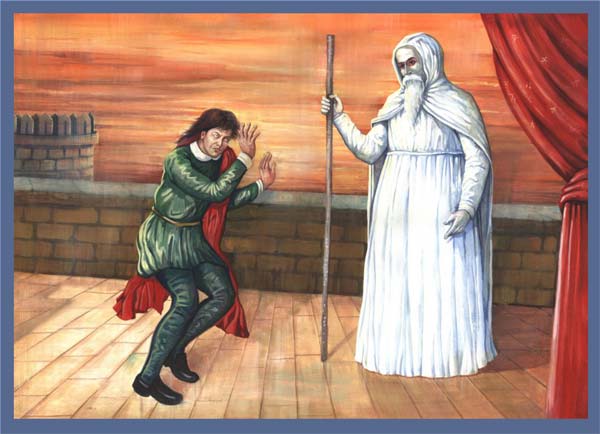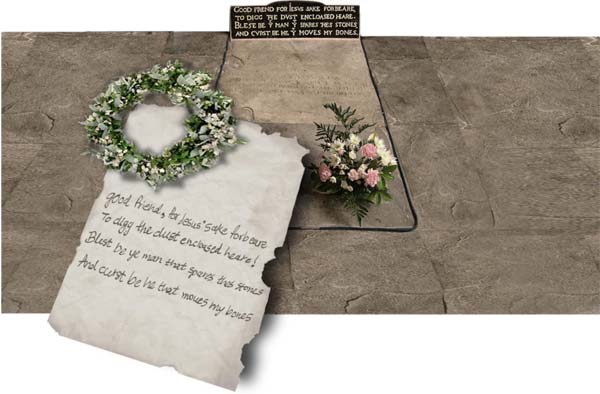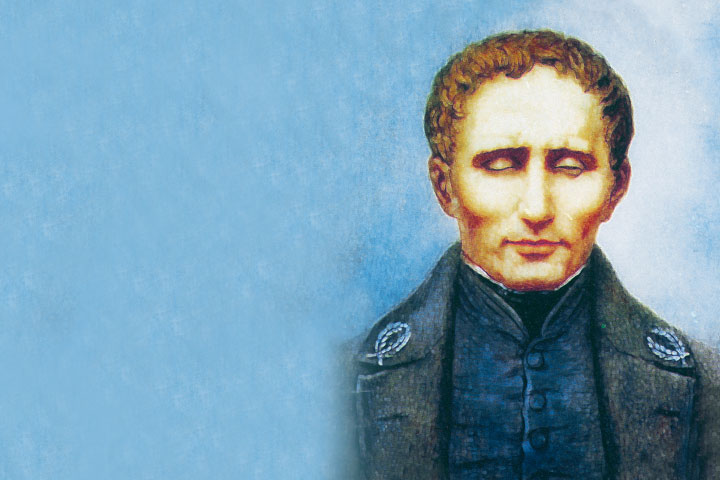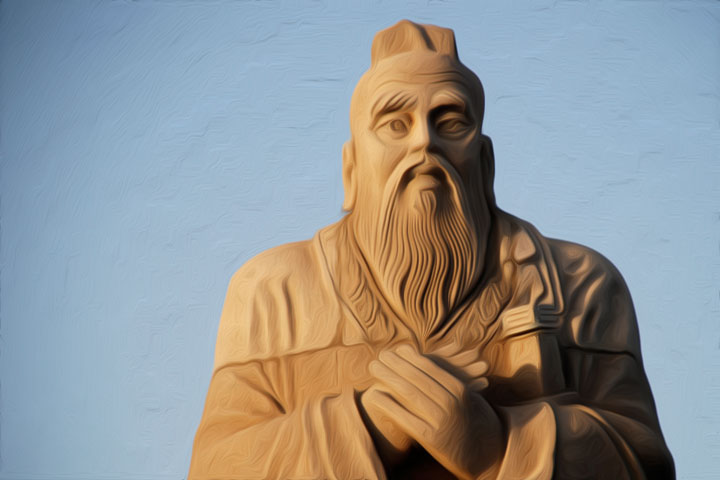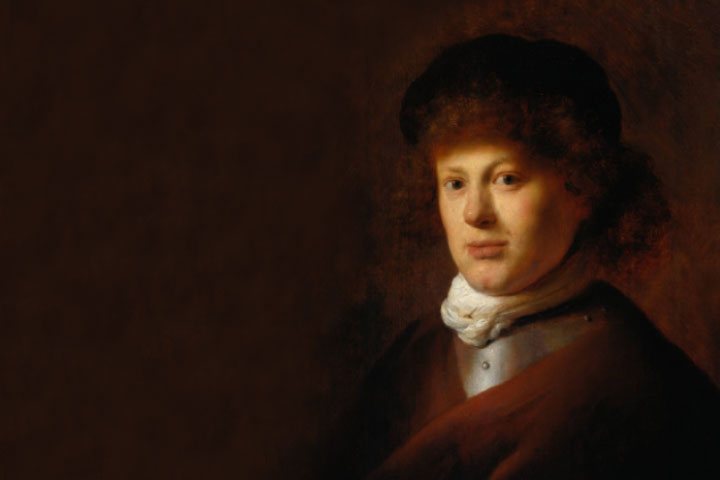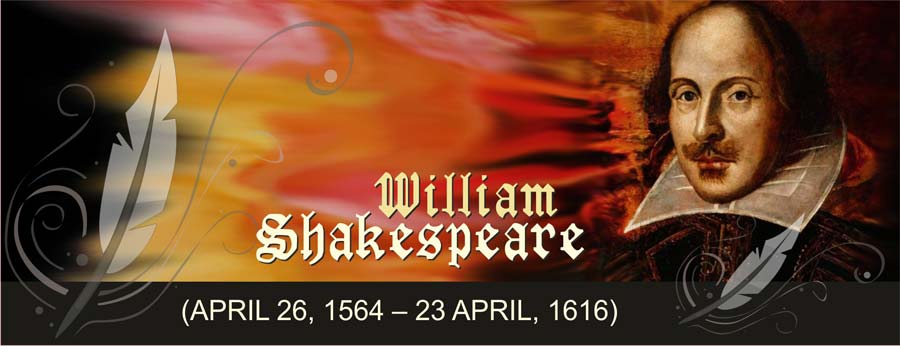
Words: they could fill a page;
With the beauty of language;
With soliloquies and asides;
With blank verse and prologues.
Words: they could grip your heart;
With the warmth of romance;
With the sorrow of tragedy;
With the joy of comedy.
Words: they could stir your soul;
With dramas that took centrestage;
In the Elizabethan Age;
By the Bard of All Age!
The words that we see and read, the words that we hear, the words that we speak…WORDS…they convey a lot to the world about us and also vice-a-versa. And it happens only once in eons that a playwright comes along who has a passionate play with words and he leaves us with a legacy to imbibe and learn from. This most wonderful playwright wove his dramas with the use of words in such a way that language was never the same again. Literature became rich, language grew and the words used in his dramas found their way into the dictionary and became our vocabulary to use, forever.
William Shakespeare has woven the rich tapestry of words into beautiful language in captivating dramas and mesmerizing poetry; gripping us in the lustrous sheath of the Queen’s language; bringing a beauty to it that has lasted generations. A brilliant wordsmith, the way he has intelligently used language to catapult his dramas to great heights, makes him a dramatist par excellence. Many of the common words in use today owe their heritage to William Shakespeare. What a most wonderful legacy!
‘We know what we are, but know not what we may be’, said William Shakespeare.
Shakespeare was perhaps unaware of the dramatic impact he would leave on the world stage through his numerous poems, sonnets and plays. His immense contribution to English literature remains unparalleled. Who hasn’t heard of him? Every school student knows about Shakespeare. Shakespeare’s name instantly arouses our thoughts of brilliant dramas such as, ‘Romeo and Juliet’, ‘Julius Caesar’, ‘A Midsummer Night’s dream’, ‘Macbeth’, ‘Hamlet’, ‘The Merchant of Venice’ and many others. This great playwright, poet and actor has etched his indelible impression on our minds by capturing and expressing human emotions and conflicts beautifully on the wide canvas of his work. The works of this supreme writer in the English language are read and performed not only in cities, but also in numerous villages and towns, across countries and continents...such is his reach! The Complete Works of Shakespeare has been translated into more than thirty languages. The individual editions of the plays and poems have been translated into over eighty languages from Arabic to Zulu. Drama conveys the language of thoughts, feelings and emotions in physical expression; this universal language was harnessed and displayed splendidly in Shakespeare’s plays; they have delighted readers and audiences everywhere, for his dramas have universality in them and break all man-made barriers.
William Shakespeare was a respected man of the dramatic arts in the late 16th and early 17th century, who wrote plays and also acted in some of them. However, it was in the 19th century that he earned the reputation and the recognition of a pre-eminent dramatist. Though considerable controversy and speculation abounded due to the sketchy details of his life, the Romantics of the early 1800s acclaimed Shakespeare’s genius to the point of worship and reverence, that George Bernard Shaw called ‘bardolatry’. In the 21st century, his plays are still highly popular and are a great source for constant study and reinterpretation in performances.
Shakespeare is considered to be one of the best English language writers ever and is often called as the ‘Bard of Avon’. Actor David Garrick wrote, “For the bard of all bards was a Warwickshire Bard.” Shakespeare got this title and the nickname ‘Bard’ (meaning poet) seemingly in recognition of his stature as ‘great poet’ and the unofficial ‘national poet of England’. He has left a profound impact on the world in the areas of literature, art, culture, theatre and film. About 37 plays, 154 sonnets, 2 long narrative poems, several other poetries and some collaborative works reflect his exemplary genius.
“All the world’s a stage,
and all the men and women merely players:
they have their exits and their entrances;
and one man in his time plays many parts,
his acts being seven ages.”
(As You Like It, Act II, Scene VII)
Famous words from a famous man. Now let us see the parts and the acts enacted out by the greatest playwright of all times on this big, beautiful world stage of ours and get immersed in the fascinating drama of his life.

birth of a legend
‘When we are born, we cry that we are come to this great stage of fools.’
William Shakespeare’s personal history is itself a mystery! Just as he kept up the suspense in his celebrated dramas, the basic outline of this famous playwright’s life is rather obscure; historians had to script the dramatic saga of his life mainly from the official documentation in church and court records that have survived from the Elizabethan times. Other records were made through his poems, sonnets, plays and the anecdotes and criticisms of his contemporaries.
William’s parents were John and Mary Shakespeare. His father, John Shakespeare, was a successful glover and leather merchant, who dabbled in tanning and whittawering (working with white leather to make purses and gloves and other such items). He had bought property in Stratford and settled in this town by 1552. He also dealt in grain and held official positions as ‘Alderman’. William’s mother, Mary Arden, was a local landed heiress. She married John Shakespeare in 1557. Mary Arden was the youngest daughter in her family and inherited much of her father’s landowning and farming estate when he died. In 1558, the couple had their first child Joan, but unfortunately, she died just two months’ after birth, supposedly from the Bubonic plague. By 1560, John Shakespeare was one of the fourteen burgesses who formed the town council and was thus a prominent man in Stratford. The stork visited the couple for a second time in 1562 and they had their second child, Margaret. Again their happiness was short-lived as this sweet little baby girl died a year later due to Bubonic plague.
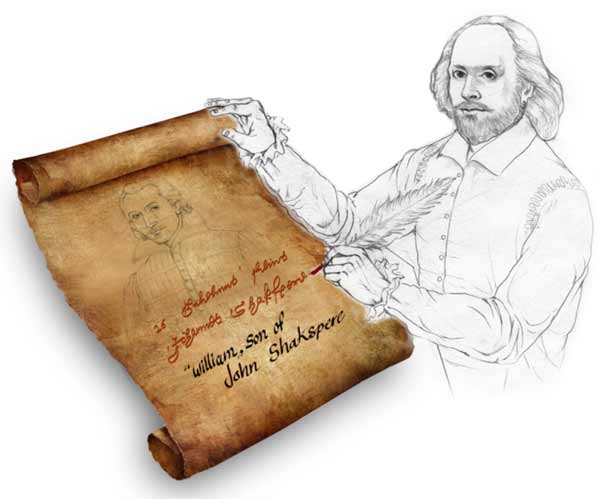
Their misery however gave way to great joy when they had a beautiful baby boy a year later. This baby boy was named William. As per church records, the infant William was baptized on April 26, 1564, a Wednesday, in the Holy Trinity Church in Stratford-upon-Avon, a market town in Warwickshire, England. From this, scholars have acknowledged the birthday of William Shakespeare as April 23, 1564, which is St. George’s day, since no other birth records exist. Also, the Prayer Book in those times instructed the parents as to not delay the baptism of their child beyond the Sunday following birth. The baptismal record in Latin reads ‘Gulielmus, filius Johannes Shakspere’, meaning ‘William, son of John Shakspere’. Shakespeare’s family name is spelled in different ways, and ‘Shakspere’ is how it appears in many Stratford records.
John Shakespeare and Mary Arden had eight children, three of whom died in childhood. William was the oldest of his surviving siblings. He had four sisters and three younger brothers. Gilbert, his younger brother was born two years’ after him in 1566. William’s father, John also held position for a year as ‘High Bailiff of Stratford’ in the year 1567. William’s younger sister, who was again named Joan, was born in 1569. Another little girl, Anne, was born in 1571 and one more addition to the family followed in the year 1574 with the birth of Richard.
“What’s in a name? that which we call a rose
By any other name would smell as sweet.
(Romeo and Juliet, Act II, Scene II)
Yes, William Shakespeare by any other name perhaps would have been just as famous, but it goes without saying that an exquisite rose bud was awaiting its chance to bloom and leave its everlasting fragrance in the garden of earth, by weaving thoughts into dramas. In his younger days, William, perhaps with his younger brother Gilbert, attended the Christian Holy Trinity Church, situated on the banks of the Avon river. Here he studied the Bible and the Book of Common Prayer. He enjoyed playing football and indulged in field sports. Around the age of 11, he learnt reading and writing and had a rigorous training in Latin, Grammar, History and the Classics at the King’s New Grammar School in Stratford. He qualified for free tuition since he was a public official’s child.
From 1576 onwards, John Shakespeare’s fortunes started declining. The fear of facing creditors and being arrested by them made him stop attending council meetings. He even mortgaged his wife’s property at Wilmcote to raise money. As though the financial setbacks in his family were not enough, William had to face his first personal tragedy in 1579, when he was around 15 years and in school; Anne, his younger sister, died at the tender age of seven. William and his family were deeply affected by this turn of events and William then tried hard to earn a living. A last addition to the family followed with the birth of another younger brother for William in 1580, who was named Edmund.

the bond of marriage
Cupid struck William at the rather young age of 18 and he got married to Anne Hathaway from Shottery. Anne was the daughter of an old family friend, a Yeoman farmer at Hewlands Farm, Shottery; a small village west of Stratford. The wedding took place on November 27, 1582, by special license, possibly at Temple Grafton Church in Worcester, in Canterbury Province. Anne was 26 at the time of marriage. They had three lovely children, a daughter, Susanna, and twins, Hamnet and Judith. Susanna was baptized on May 26, 1583. Two years later, the twins - Hamnet and Judith were baptized on February 2, 1585, at Holy Trinity Church. Hamnet and Judith were named after William’s close friends, the baker Hamnet Sadler and his wife, Judith.

Interval – The Lost Years (1585-1592)
After the birth and baptism of Shakespeare’s twins in 1585, no records exist of the next seven years of Shakespeare’s life upto 1592, when he surfaced as an established playwright in London. This is from the age of 21 to 28 years approximately. Termed as the ‘lost years’, theories and possibilities abound of that period. Shakespeare perhaps was as lost as anyone else in this age in trying to find his niche in life. One written record (around 1616) by Richard Davies, a clergyman in Gloucestershire, tells that he might have fled from Stratford for poaching the deer and rabbits from the local landlord, Sir Thomas Lucy’s park at Cherlecot, near Stratford. After having been caught for the offence committed, Sir Thomas meted out a rather harsh punishment to Shakespeare. Enraged, Shakespeare is said to have avenged the punishment by composing a satirical ballad. This got him into bigger trouble and he was forced to flee London, to escape further punishment.
English antiquary, natural philosopher and writer, John Aubrey, had written in his work, ‘Brief Lives’ (1681) that William Shakespeare “…had been in his younger yeares a Schoolmaster in the countrey.” It is believed that John Cottom, a teacher at Stratford school whose family home was in Lancashire, found work for Shakespeare as a tutor for the family of Alexander Houghton, a local landowner. Houghton did mention a ‘William Shakeshafte’ in his will.
It is generally believed that William Shakespeare arrived in London from Stratford looking for work, in the mid - to late 1580’s. He may have dabbled in different jobs, as a lawyer’s clerk, a teacher, or a horse attendant at some of London’s finer theatres, before he began to pursue the craft he was meant for- writing and acting. He also handled his business affairs well. It is believed that he pursued his passion with such vigour that he left his family in Stratford for some twenty years during this time, visiting only once a year during the forty day period of Lent, when theatres would be closed in accordance with the traditional ban around this important Easter event. During these times, it is assumed that Shakespeare’s family remained in Henley Street, Stratford, while he stayed in the lodges of London.

Elizabethan Theatre
William Shakespeare lived in the time of the English Renaissance, a great period for world literature. Many great works, like Plutarch’s ‘Lives’, Ovid’s ‘Metamorphoses’, Homer’s ‘Illiad’, Holinshed’s ‘Chronicles’ and Aristoto’s ‘Orlando Furioso’, had been translated into English. Literary playwrights including Shakespeare borrowed freely from them and were highly influenced by these works, contemporary sermons and street ballads.
Drama is said to be a mirror of its times. In the last three quarters of the sixteenth century, Queen Elizabeth I ruled England. It was the main form of Elizabethan art since Elizabethan writing was supreme in the demonstrative expression of feelings and sensations. Shakespeare wrote for an Elizabethan audience, outstanding in the vitality of language and literature. Queen Elizabeth I had her own acting company called the ‘Queen’s Men’ and was a generous patron of the theatre. Theatre flourished in her time, and Shakespeare prospered during her reign.
Theatre in Shakespeare’s days was very different from what it is today. Largely, there were rectangular open air theatres with a thatched roof. The stage was just a bare room with tapestry covered walls and a portion of the gallery was covered. There were no curtains to open and close the show; no moveable scenery or machinery, as we have now. A blowing of the trumpet heralded the beginning of the play. The law prohibited women from acting and all the female roles were played by clean-shaven young men or boys. For a comedy play, the stage would be draped with blue hangings and for a tragic play, it would be substituted with black.

Birth of a Dramatist - The Poet, Playwright and Actor
William Shakespeare is supposed to have begun his career as a dramatist a few years before 1590. The sonnets and plays of William Shakespeare portray a myriad range of human emotions and leaves it open to us for our own interpretations. However, what reflects through his plays chiefly is the profound understanding of human nature in all its forms, and the lyrical quality of his work.
Shakespeare’s greatness is said to be partly due to his predecessors’ work. Scholars have opined that Shakespeare began his career by rewriting the plays of others, including Robert Greene. While Spenser and Sydney mastered the verse, Christopher Marlowe excelled in the managing of character and situations as per theatrical requirements. The classical translations of those times were inspirations for Shakespeare. He bequeathed the best of himself into his works by adding to it his own qualities of music, wit and philosophy and moulding them into excellent dramas.
For some time he was also a member of Lord Pembroke’s company, based at The Rose Theatre in Southwark, London. It was the most successful company in London in those days. In the 1590s, acting companies also gave court performances, and early in his career, Shakespeare gave performances before Her Majesty Queen Elizabeth I herself; a wonderful achievement for a young actor. By showing considerable promise, he also attracted the attention of Henry Wriothesley, the Earl of Southampton. Success and popularity have their pitfalls, and playwrights like Robert Greene began to envy him. Greene subjected Shakespeare to a critical attack in 1592 in his pamphlet, ‘Groatsworth of Witte, Bought with a Million of Repentance’ thus:
“Yes trust them not: for there is an upstart Crow, beautified with our feathers, that with his Tyger’s hart wrapt in a Player’s hyde, supposes he is as well able to bombast out a blanke verse as the best of you: and beeing an absolute Iohannes fac totum (Jack-of-all-trades, Master of none), is in his owne conceit the onely Shake-scene in a countrey. O that I might entreate your rare wits to be employed in more profitable courses: & let these Apes imitate your past excellence, and never more acquaint them with your admired inventions.”
This criticism also appeared in an edition of the Stationers’ Registrar (a guild publication) on September 20, 1592. In those days, there was no such thing as ‘copyright’. All pamphlets, plays and books were to be entered in the Stationers’ Registrar, who protected the publisher from any infringement of his rights.
Many scholars interpret this criticism in differing ways, but most agree that Greene meant that Shakespeare was trying to match the standards of well known university-educated playwrights like Thomas Nashe, Christopher Marlowe and Robert Greene himself.
On the personal front, William’s father, John had been removed from his civic duties and was in huge debt. He had even stopped attending the church. This was by the year 1592. The wheel of fortune however changed due to William’s success and fame in the London theatre circle. He took care of his family and restored his father’s lost pride.

In 1593, noted playwright Christopher Marlowe, one of Shakespeare’s contemporary rivals, died suddenly in a tavern brawl. Shakespeare now became the most prominent dramatist and his writing career grew further. In the same year when Shakespeare was 29 years old, London was affected by the outbreak of Bubonic plague and many fled the bursting city to the clean airs of the countryside. Many upstart theatres which were the popular source of public entertainment were shut down for long stretches of time. Left with no other option, Shakespeare put his free time to good use and unleashed his creative streak. He is supposed to have penned many more plays and sonnets during these dark times and strengthen his writing career. He entered his first poem ‘Venus and Adonis’ in the Stationers’ Registrar on the 18th of April, 1593. The comedic and erotically charged narrative poem became wildly popular and went through nine editions in as many years. The much darker poem ‘The Rape of Lucrece’, his second poem was registered on the 9th of May, 1594. Both these poems showed the outcome of uncontrolled passion and were dedicated with great regard to his patron Henry Wriothesley, the Earl of Southampton and were highly influenced by Ovid’s ‘Metamorphoses’.

For the Passion of Drama
By 1594, the lure of the theatre drew Shakespeare back into its fold and he did much good work. From 1594 onwards, William Shakespeare was an important member of the ‘Lord Chamberlain’s Men’, an acting company of theatrical players in London. He was not only acting and writing for them, but became a managing partner as well. Shakespeare’s plays were performed by his own company (Lord Chamberlain’s Men) at ‘The Rose Theatre’ and the ‘Curtain’ in Shoreditch, north of the River Thames. About this time, he was living in the parish of St. Helen’s, Bishopsgate, which was also to the north of the River Thames. Lord Chamberlain’s Men soon became a favourite London troupe. Many of the royalty like Lord Chamberlain, Henry Carey and Lord Hunsdon were patrons of their dramas. It was also very popular with the theatre–going public. Will Kempe, a master comedian, and Richard Burbage, a leading tragic actor were two popular artistes of those days. Richard Burbage had done much to raise the profile and respectability of the theatrical profession.
Shakespeare’s plays were published as popular literature and he received much acclaim and admiration. Success in theatre made him wealthy, and his social influence also increased due to the prestigious patrons of his theatre. He applied and was granted a ‘Coat of Arms’ (a symbol or a collection of symbols usually represented on a shield that indicated the traits of a particular family) in 1596, as per records with the College of Heralds. This serves as an indication of his wealthy status as also the adoption of the coveted title of ‘gentleman’ in his title deeds.
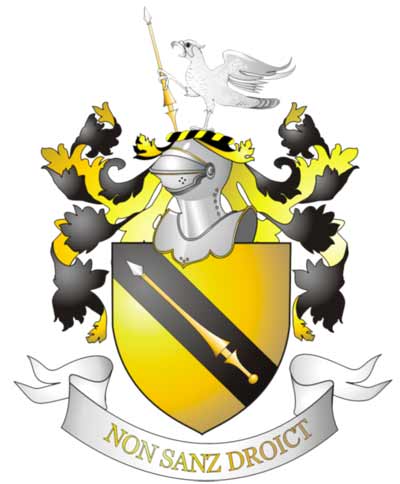
Tragedy struck William Shakespeare when his son, Hamnet, died due to unknown causes at the age of 11 on August 11, 1596. This was the same year in which he wrote ‘King John’. ‘Constance’s’ speech in ‘King John’, beginning with “Grief fills the room of my absent child” was a reflection of Shakespeare’s personal grief at his terrible loss. The heaviness in his heart made itself visible in the sadness in this play but nevertheless he continued pouring his soul into his writing, thus building his reputation.

A Man of Substance
After the death of Lord Chamberlain Cobham in 1596, Shakespeare’s company had a dispute with the landlord with regard to the lease which expired a year later. The Rose Theatre was pulled down and its timber was used for their new venture, not far from the previous one.
William Shakespeare was as much an astute businessman as an artist. He decided to invest some of his income in property. In 1597, at the age of 33, he purchased a major residential property, New Place on Chapel Street in Stratford, for his family. New Place was a beautiful, timber-framed three-storey house, the second largest house in Stratford town and one of the most prominent and desired properties. It had been built by the wealthy Clopton family and had fine gardens, orchards and land stretching down towards the River Avon. It is said that Shakespeare might have bought this property with money from his plays, since around 15 of his 37 plays had been written, published and performed by 1597. New Place was located in the centre of the town on Chapel Street, opposite the Guild Chapel, and showed the world that Shakespeare was now a man of substance.
Shakespeare’s reputation as a poet also grew along with the jabs from his contemporaries. In 1598, English Churchman and author Francis Meres in his ‘Palladis Tamia: Wit’s Treasury’ criticized him as being, “mellifluous and honey-tongued…witness his Venus and Adonis, his Lucrece, his sugared sonnets among his private friends.”
By 1599, William Shakespeare along with his business partners including Lord Chamberlain Hunsdon (the son of Lord Chamberlain Cobham), built their own theatre, the ‘Globe’, on the south bank of the River Thames at Southwark. At this time, Shakespeare used to stay at Southwark. The ‘Globe’ opened in the autumn of 1599. Shakespeare immortalized the ‘Globe’ as the ‘Wooden O’ in ‘Henry V’, which he wrote in 1599. In the same year, Shakespeare applied for his mother’s Coat of Arms to be added to his own.
Shakespeare continued writing his plays. He also wrote a very fine poem entitled ‘The Phoenix and the Turtle’, which appeared in 1601 as one of the political essays in Robert Chester’s ‘Love’s Martyr: or Rosalind’s Complaint’.
During the year 1600-01, Shakespeare’s father fell ill, and on September 8, 1601, he passed away. Coming within five years of the death of his only son Hamnet, Shakespeare’s grief was quite visible in the play ‘Hamlet’ that was written during this year. Death is a life-changing event as it sometimes not only transforms the consciousness of a person but also his perception of the world. Shakespeare experienced a deep transformation which was evident in the making of his masterpiece ‘Hamlet’. Shakespeare’s own psychic transformation happened when he journeyed into the deep recesses of his own mind and expressed it through Hamlet’s soliloquies. The tragedy of loss and the catharsis thereafter enabled a spiritual transformation in Shakespeare, which healed his soul and led to his personal rebirth.
After his father’s death, William inherited the family home in Henley Street, Stratford, and later leased certain part of it to tenants. In 1602, William who was 38 years old now, bought around 107 acres of arable land with twenty acres of pasturage for 20 pounds in Old Stratford. This was also subsequently leased out.
In 1603, James I succeeded Elizabeth I to the throne. Shakespeare received a patent, titling him as one of the King’s Men (previously called the Chamberlain’s Men) and a Groom of the Chamber by King James I, on May 19, 1603. After this honour, Shakespeare became a favourite for all court performances and each member of the King’s Men earned extra money of £ 30 for a performance in 1603 alone. William Shakespeare’s name thus became above reproach. Richard Burbage, Henry Condell, John Heminges, Robert Armin and William Kempe were some of the actors who were working with Shakespeare at that time. Some of Shakespeare’s plays were performed at King James I Court, between November 1604 and October 1605.
William Shakespeare lived in many lodges and by 1604 he moved again to the north of River Thames, to a fine house in an area north of St. Paul’s Cathedral. William’s greatest financial gain was in 1605 when he purchased leases of real estate near Stratford for £ 440. This investment doubled in value and earned him a handsome income of £ 60 every year. It is believed that this good investment gave the Bard of Avon the time to write his plays uninterrupted.
Shakespeare often took the Oxford route to Stratford during his London days. He used to stay at the inn, ‘Crown Tavern’ in Oxford, whose proprietor was a wealthy vintner (fine wine wholesaler offering an unrivaled level of expertise) named John Davenant. When John and his wife Jane Davenant had to baptize their child, William Davenant, on the 3rd of March, 1606, William Shakespeare stood as a godfather for him.
A year later on June 5, 1607, William Shakespeare’s daughter, Sussanna married Dr. John Hall, a physician. She was blessed with her first child, Elizabeth, in the year 1608. Just as happiness and sorrow are a part and parcel of life, these happy events in Shakespeare’s life were undermined by the great personal losses he experienced when his younger brother Edmund died in 1607 and later when his mother, Mary was cremated on September 9, 1608.
In 1608, Shakespeare and his business partners took over ‘Blackfriars’, an indoor theatre in London. His company performed at the Blackfriars theatre during the winter and the Globe theatre in the summertime. The indoor setting allowed Shakespeare the use of more elaborate stage devices.
A third narrative poem of Shakespeare’s, ‘A Lover’s Complaint’, was printed in the first edition of the Sonnets, titled ‘Shake-speares Sonnets’ in 1609 by Thomas Thorpe. The Sonnets were the last of Shakespeare’s non-dramatic works. In Shakespeare’s sonnets, one series referred to an uncontrollable lust for a ‘dark lady’, a married woman of dark complexion. The other series referred to the conflicted love for the ‘fair youth’, referring to a fair young man. According to the famous poet William Wordsworth, with these sonnets, ‘Shakespeare unlocked his heart.’
Shakespeare was a successful playwright, and he not only performed in his own plays, but acted in those of others as well. In 1610, John Davies of Hereford wrote, ‘good Will’ played ‘kingly’ roles. In Ben Jonson’s ‘Works’ (1616 edition), William Shakespeare’s name got mentioned on the cast lists for ‘Every Man in His Humour (1598)’ and ‘Sejanus His Fall (1603)’.
William Shakespeare is said to have drafted his first will in 1611. He was a shareholder in the Globe and Blackfriars theatre. He suffered some personal setbacks when his younger brothers Gilbert and Richard died in 1612 and 1613 respectively. Simultaneously, his professional life suffered too when on 29th June, 1613, the Globe theatre got completely destroyed when a squib fired from a cannon, set fire to the thatch during a performance of Henry VIII. Later, in 1614, a 50 year old Shakespeare decided to retire to his home, New Place, in Stratford.
English poet and critic Samuel Johnson once said that Shakespeare’s plays are not “in the rigorous sense either tragedies or comedies, but composition of a distinct kind.” Shakespeare’s plays unite laughter and sorrow, as also the ludicrous and serious characters. In actuality, his work is too profound to be fitted into any particular group. Yet, his plays have been classified into histories, comedies and tragedies for the sake of convenience. Let us have an overview of his plays and their classification before proceeding on to his retired life.

In Art as in Life : Histories, Comedies and Tragedies
“When we our betters see bearing our woes,
We scarcely think our miseries our foes.
Who alone suffers most i’ the mind,
Leaving free things and happy shows behind”
(King Lear, Act III, Scene VI)
Memorable lines…inspiring quotes. There are innumerable of these in Shakespeare’s plays. Through his dramas, Shakespeare has left behind for us a plethora of notable quotes, which continue to inspire and motivate us. These words of wisdom not only make us ponder over their meaning, but empower and transform us by shifting our moods. “If all the year were playing holidays / To sport would be as tedious as to work” (Henry IV Part I - Act I, Scene ii), propounds the message that too much familiarity to any schedule removes the fun out of it and brings in boredom or tiredness. Powerful words of good advice like, “This above all: to thine own self be true” (Hamlet - Act I, Scene iii) tells us to be honest with our own inner self and face our own reality without any false images to hide the real us from the world, for our true potential to arise. What… could have inspired Shakespeare? What else but...life!
Life, in itself, is a superscript. Art, it is said, imitates life. Life is a source of inspiration for art. It has every situation to inspire an art form; be it a painting, poem, music, song, film, or as in William Shakespeare’s case, drama. The drama of life has all the ingredients for a lay person; he can choose to get inspired by it or be discouraged by the setbacks offered by it. Life brings out all the ideas…the power to transform these ideas and blossom fully lies within each of us. Many an artist has been creatively inspired and this influence has resulted in their beautiful art forms. Shakespeare converted all the ideas he got from the reality of life into artful masterpieces and shone as a playwright by putting it across to the world through his passion - dramas.
Shakespeare’s works encompass the period from 1584 to 1613. His wide ranging imagination and his deep understanding of human nature gave his pen a beautiful command over language and his plays were acted out by many characters on stage. Shakespeare’s plays were full of rich and profound philosophy. The early plays that he wrote were mainly histories and comedies and the later works were mainly tragedies.
Shakespeare wrote most of his first plays which were based on English history in the 1590s. ‘King Henry IV Part 1 and 2’, ‘King Henry V’, ‘King Henry VI Part 1, 2 and 3’, ‘King Henry VIII’, ‘King John’ and ‘Richard II and III’ were his historical plays. He derived the material for his historical plays mainly from the 1587 edition of the English chronicler, Raphael Holinshed’s ‘Chronicles of England, Scotland and Ireland’. Shakespeare was not a historical chronicler and meted out his artistic treatment to his source. ‘Henry V’, ‘Henry VI parts 1, 2 and 3’ and ‘Richard II’ were dramas which showed the destructive results wrought by corrupt or weak rulers. Scholars interpreted this as Shakespeare’s way of justifying the origins of the Tudor dynasty that ruled England from 1485 to 1603. Whether it is the depiction of the horror of civil war, or his representation of an ideal monarch of a united nation (‘Henry V’), Shakespeare’s political ideology is hinted at in some of his plays. In ‘Henry IV, parts 1 and 2’, and ‘Henry V’, Shakespeare introduced comedy into the serious histories by making his characters more complex, but at the same time tender also. The character of Falstaff in ‘Henry IV’ was well liked by Queen Elizabeth I. ‘Richard II’ was a lyrical and was written almost entirely in verse. In 1613, Sir Henry Wotton wrote: “Henry VIII was set forth with many extraordinary circumstances of pomp and ceremony.”
According to critic Stopford Brooke, Shakespeare’s purpose of writing historical plays was artistic and not political. He said, “Shakespeare desired to combine all plays into a whole. In completing it, the moral and political philosophy of good or bad government comes in as a necessary part of the conception, but its lessons were not directly or indirectly given. His true aim was to represent human life in action and thought within the limits which history set before him.”
During the period of the 1590s, William Shakespeare also wrote several comedies. Some of them were ‘The Taming of the Shrew’, ‘The Comedy of Errors’, ‘The Two Gentlemen of Verona’, ‘Love’s Labour’s Lost’, ‘A Midsummer Night’s Dream’, ‘The Merchant of Venice’, ‘Much Ado About Nothing’, ‘As You Like It’ and ‘The Merry Wives of Windsor’. These comedies were followed later by ‘Troilus and Cressida’, ‘Twelfth Night’, ‘All’s Well That Ends Well’, ‘Measure for Measure’, ‘Pericles - Prince of Tyre’, ‘Tempest’, ‘Cymbeline’ and ‘Winter’s Tale’.
In a Shakespearean comedy, there was music and dance with love finally culminating in marriage. In these plays, Shakespeare displayed his penchant for drama. ‘The Comedy of Errors’ was based on the classical model of Plautus while ‘The Taming of the Shrew’ was based on an Italian comedy. These two early comedies along with ‘Love’s Labour’s Lost’ and ‘The Two Gentlemen of Verona’ were considered immature plays and signified the early efforts of a playwright who was to later taste unprecedented success in his career.
Shakespeare’s later comedies were joyous ones with a romantic atmosphere. ‘A Midsummer Night’s Dream’ was a good amalgamation of romance, wit, fairy magic and comedy. In the same play, the line ‘a fair vestal throned by the west’ was said to be a direct reference to Queen Elizabeth I. The Queen liked the character of Falstaff in Henry IV so much that Shakespeare was asked to write a play that showed the same character in love. This inspired the play ‘The Merry Wives of Windsor’. ‘The Merchant of Venice’ was a beautiful romantic comedy with ‘Portio’ and ‘Bassanio’ as the lovers, who were much loved by the ardent readers of this bright comedy. It also had the powerful character of ‘Shylock’, the vengeful Jewish moneylender.
‘Much Ado About Nothing’ had much wit and wordplay. ‘As You Like It’ had a charming rural setting and in ‘Twelfth Night’ there was lively merry-making. These three romantic comedies had the Shakespearean fragrance of love, music, humour and vibrant vitality in them and are considered his masterpieces. Shakespeare borrowed from Thomas Lodge’s novel, ‘Rosalynde’, for his play ‘As You Like It’, which featured the lovers ‘Orlando’ and ‘Rosalind’. Improvement in characterization and the heroine’s exquisite role in them made the plays a marked improvement over the earlier ones.
Some of Shakespeare’s plays like ‘The Two Gentlemen of Verona’ and ‘The Tempest’ had an Italian background. Italian literature was widely read in those times. Either Shakespeare had knowledge of the language or it is quite possible that he got the information from John Florio, an apostle of Italian culture who was living in England and was also tutor to Shakespeare’s patron, Henry Wriothesley, the Earl of Southampton.
‘Troilus & Cressida’, ‘All’s Well That Ends Well’ and ‘Measure for Measure’ were the so-called ‘problem plays’. They belonged to the genre of dark comedies written by Shakespeare from 1602-1605. In these plays, the moral values were very low and they represented the baser passions of human nature.
The tragedies (tragic plays) of Shakespeare were thought of to be his greatest plays. They spoke of unhappy endings, of the sorrow, death and suffering which befall the hero of the play. As per A. C. Bradley, the famous literary scholar of those times, a Shakespearean tragedy is “a story of exceptional calamity leading to the death of a man of high estate.” William Shakespeare royally designed, controlled and guided the actual play of life in the tragedies that he wrote. Of the tragedies, only ‘Titus Andronicus’ and ‘Romeo and Juliet’ were written in the 1590’s, the rest were written after 1600. The classical model of Seneca served as the base for ‘Titus Andronicus’. ‘Julius Caesar’, ‘Antony and Cleopatra’ and ‘Coriolanus’ were tragedies based on the Roman history. Shakespeare’s other passionate tragedies were ‘Hamlet’, ‘Othello’, ‘King Lear’, ‘Timon of Athens’ and ‘Macbeth’.
The stark impressions of human behaviour displayed by these characters were universal and timeless. Shakespeare’s characters came alive with burning intensity in his plays. The twists and turns in the plots of Shakespeare created by these moral failures, ended up destroying the hero and the ones he loved. The feelings of pity and terror which were evoked during these tragedies, purified the mind of these emotions themselves, and were thus cathartic to the individual. Shakespeare’s approach to tragedy was intellectual and the catharsis was the culmination of this approach.
In a Shakespearean tragedy, the hero was a man with grandeur and nobility, of high standing and intelligence, but dominated by a fatal flaw which led to his death and that of those around him. The inner fortitude of a human being develops when he undergoes a tragedy, and this is a blessing which is unseen and unrecognized by many. Dowden, the famous critic has said: “tragedy as conceived by Shakespeare is concerned with the ruin or restoration of the soul and of the life of man.”
‘Romeo and Juliet’ was one of his most famous plays of romantic love and tragedy in a world of hatred. It was mainly based on the 1562 poem of Arthur Brooke’s, ‘The Tragical Historye of Romeus and Juliet’. This poem was inspired by real lovers who lived in Verona, Italy and died for each other in the year 1303. ‘Hamlet’ is also one of Shakespeare’s best known plays. It was a tragedy of inaction and a story of betrayal, moral failure and retribution. “To be or not to be; that is the question”, is a very famous quote said by the title hero Hamlet.
‘Julius Caesar’ was based on Plutarch’s ‘Parallel Lives’ and introduced a new kind of drama, with political ambition and lust for power, and the conflict between idealism and practicality. Julius Caesar is stabbed to death in a very dramatic scene. The Latin words, ‘Et, tu, Brute?’ (‘Even you, Brutus?’) which Caesar utters as he is stabbed to death by his friend Brutus and other assassins is a very famous line. The display of violence and bloodshed was necessary in those times to enhance the dramatic effect and appeal of the play, and to get people to flock theatres. Shakespearean scholar James Shapiro wrote of ‘Julius Caesar’ thus, “the various strands of politics, character, inwardness, contemporary events, even Shakespeare’s own reflections on the act of writing, began to infuse each other.”
‘Othello’ was a revelation of character. The fatal flaw of judgment in the play showed the tragedy of the Moor who caused the murder of his innocent wife, Desdemona. In ‘King Lear’, the old King committed the tragic folly of giving up his powers. It represented the tragedy of a barbaric age. ‘Macbeth’ was the tragedy of uncontrollable ambition which resulted in murder and later guilt. It is considered that the play ‘Macbeth’, which celebrated Malcolm, the ancestor of King James I, was partly written as a tribute to the King’s patronage. The plays ‘Antony and Cleopatra’ and ‘Coriolanus’ had some of the finest poetry of William Shakespeare. The poet and critic T.S. Eliot termed them as Shakespeare’s “most successful tragedies”.
The final period was when William Shakespeare wrote the tragicomedies. Chief among them were ‘Cymbeline’, ‘The Winter’s Tale’ and ‘The Tempest’. The tone of language in these tragicomedies was graver than those of the 1590s, but whereas ‘King Lear’ and ‘Macbeth’ were dark tragedies, the above three plays ended on the theme of forgiveness and reconciliation. In the words of literary historian Albert, “The style is notable and serenely adequate, and with the ease of the master, the author thoroughly subdues the metre to his will. No more fitting conclusion – rich, ample, and graciously dignified – could be found to round off the work of our greatest literary genius than these plays of reconciliation and forgiveness.”
Shakespeare also wrote ‘Pericles, Prince of Tyre’, ‘Henry VIII’ and ‘The Two Noble Kinsmen’. Two of his plays, ‘The History of Cardenio’ and ‘Love’s Labour’s Won’ are however, not to be found anywhere.

The Final Exit - Curtains
‘If I must die,
I will encounter darkness as a bride,
And hug it in mine arms.’
(Measure for Measure, Act III, Scene I)
William Shakespeare did not retire in the real sense of the word. Even though he was in his house in Stratford, he often kept himself busy in theatre management in London. His was a life well spent and with his good nature and ready wit, he had many friends.
From November 1614, Shakespeare spent some weeks in London with his daughter Susanna and her husband Dr. John Hall. In 1616, William Shakespeare’s other daughter, Judith, married Thomas Quiney, a vintner and tavern owner from Stratford. The later changed circumstances of her marriage made Shakespeare revise his will on March 25, 1616. In his will, he bequeathed his properties to his daughter Susanna (his favourite). To Judith, he left 300 pounds. To Anne Shakespeare, his wife of 34 years and the mother of his children, he bequeathed the following, inserted near the end of the document: “I gyve unto my wife my second best bed with the furniture.” His second best bed has been said to refer to the marital bed, and furniture refers to the curtains and bedcover which formed part of the complete bed. His will also named fellow actors Richard Burbage, John Heminges and Henry Condell.
Within a month, this famous Bard of literature died at the age of 52 years. The reason as to how or why Shakespeare died is not clear. The Reverend John Ward, vicar of Stratford has recorded thus (in 1664): “Shakespeare, Drayton and Ben Johnson had a merie meeting, and itt seems drank too hard, for Shakespeare died of a feavour there contracted.”
‘Of all the wonders that I yet have heard,
It seems to me most strange that men should fear;
Seeing that death, a necessary end,
Will come when it will come.’
(Julius Caesar, Act II, Scene II)
His son-in-law, Dr. John Hall is said to have attended to him during his illness. It is supposed that Shakespeare died on his birthday, April 23, 1616, which is considered more of a myth than reality. But he was interned at Holy Trinity Church in Stratford on April 25, 1616.
In death too, Shakespeare left a final piece of verse as his epitaph, which is carved into the stone slab covering his grave :
“Good friend, for Jesus’ sake forbeare
To digg the dust encloased heare!
Blest be ye man that spares thes stones
And curst be he that moues my bones.”
Little is known of Shakespeare’s wife, Anne, but she passed away in 1623, seven years after his death and is buried beside him. In the same year, a statue of William Shakespeare was erected in his memory in Holy Trinity Church, Stratford-upon-Avon, by his family. It depicts him with a quill in his right hand. Its plaque compares him to Nestor, Socrates and Virgil. The Coat of Arms also appears on Shakespeare’s monument in the church.
In 1623, John Heminges and Henry Condell, his two working companions from Lord Chamberlain’s Men, printed the ‘First Folio’ edition of his collected plays, half of which were previously unpublished. Some plays had already appeared in quarto versions, while some were termed as ‘bad quartos’ (adapted, paraphrased or reconstructed from memory). In a dedicatory verse within the Folio, they claim to have recorded and collected his plays as a memorial to the late actor and playwright. The First Folio lists William Shakespeare as one of the Principal Actors in all these plays. It was a massive project compiling 36 plays from the quarto texts, playbooks, transcriptions and the memories of actors. It took two years to complete the approximately nine hundred page manuscript. It was the first collection of Shakespeare’s dramatic works and in 1623 was printed as ‘Mr. William Shakespeares Comedies, Histories & Tragedies’.
Excerpted from the Preface of the First Folio
“To the memory of my beloved, The Author, Mr. William Shakespeare: and what he hath left us.’
Ben Jonson
‘Thou art a moniment, without a tombe
And art alive still, while thy Booke doth live,
And we have wits to read, and praise to give.’
The First Folio was originally sold for just one pound in the year 1623. Its value today would be over millions. The First Folio was an exceptional collection of Shakespeare’s work and is the best showcase of the pre-eminence awarded to him. It has been dedicated to William Herbert, 3rd Earl of Pembroke and his brother Philip who were a big support for Shakespeare and his plays during his lifetime.
Shakespeare’s daughter Judith had three sons. One of her sons, Shakespeare Quiney, died in infancy. Her other two sons, Richard and Thomas both died early in 1639 within a month of each other. Shakespeare’s direct line of descendants ended when Susanna’s daughter, Elizabeth (who married twice but had no children) died in 1670. However, there could be many descendants alive even today from the marriage of Shakespeare’s sister, Joan to William Hart (before 1600). Joan outlived her famous playwright brother and passed away in the year 1646.
Many statues and memorials have been erected around the world in memory of this great playwright. He has been commemorated in funeral monuments in Southwark Cathedral and Poet’s Corner, Westminster Abbey. His art brightened the literary world with its style and content.

the strokes of the master genius his art and writing style
Written records do not clearly indicate how Shakespeare’s artistry was moulded by his professional life. His early plays were written in the conventional style of the day. It had rhetorical phrases and elaborate metaphors. He innovatively adapted the conventional style to create an easy flow of words. He mainly used blank verse (a metrical pattern known as iambic pentameter verse, with unrhymed lines) to compose his plays. Some passages in his plays deviated from such patterns and used simple prose and poetry. Later, he progressed to the use of the run-on verse regularly. In addition to blank verse, Shakespeare also introduced the unemphatic or slurred syllable. He also used Alexandrines - a line with six long stresses.
The early plays of Shakespeare show the extensive use of rhymed couplets. With the progress of his art, he reduced its use, limiting it to signal the end of an action scene. Shakespeare’s myriad characters with their countless feelings found natural expression in prose, whether in his comedies or tragedies. The prose was used in conversations, letters, documents, proclamations and even to depict the insanity in his characters. The famous critic, Verity, states: “Shakespeare’s use of prose increases as the nature of his plays grows more varied and complex.”
Shakespeare wrote most of his plays as ‘quarto texts’ (that being on a sheet of paper folded four ways). He wrote dialogues naturally perfect to the scene. Idioms and proverbs flourished and gave sharper dimensions in theatre in the Elizabethan age. Pure lyrics and songs were scattered in his plays and lended a rare beauty to it. He touched upon and probed all the moral and philosophical aspects of life in his plays. His creative work was shaped by a deep understanding of humanity.
The plays of this great creative genius written over the course of twenty years depicted all the myriad ranges of human emotions in its raw form. Shakespeare’s plays portray everlasting love which conquers over all stumbling blocks. Love uplifts and inspires both the characters in love and leads to prosperity. Love is expressed beautifully and ultimately leads to marriage. An exquisite creation of his plays was the ‘fool’ who has a contribution in all of Shakespeare’s romantic comedies. He was a witty satirist providing running commentaries on the action on stage. The fun, humour and the link between the main plot and the subplots were all provided by the fool. Shakespeare’s plays touch humanity at the deepest levels in situations that are experienced by one and all throughout the biggest play called ‘life’. The tender feelings of love, the communion in marriage, the trauma of death, the sorrow in mourning, the pangs of guilt, the confusion in making difficult choices, the angst of separation and the joy of reunion and reconciliation – all of these and more find expression in his drama forms. Actors bring life to Shakespeare’s works as they had been written to be enacted. Shakespeare’s plays are fresh and entertaining and can be easily adapted to the place and time of performance.

Criticisms
Some of Shakespeare’s plays were printed in his lifetime, though they appeared more voluminously after his death. The dramas that Shakespeare weaved out of his literary acumen began to play out in reality too. Nearly 150 years after his death, the sketchy details and the lack of contemporary primary sources of information, propagated doubts about the authenticity of the authorship of his plays. Names like Edward de Vere, Francis Bacon and Christopher Marlowe were being credited as the true authors of the plays, since their backgrounds were more known and they had literary accreditation. Though official records attested Shakespeare’s existence, they however did not confirm to his being a poet, actor or playwright. The intellectuality and writing prowess displayed in Shakespeare’s works also made skeptics doubt as to how a man of such modest education could write so well.
Several groups formed over the centuries question the authorship of Shakespeare’s plays and of the chronology of the sonnets and plays. Speculation about such matters as his religious beliefs and sexual orientation also abound.
Adoration of Shakespeare was at its peak in the 19th century. This was also the time when there was intense skepticism among his detractors. According to them, the only real evidence of the Bard of Avon was that he was a young married man of modest beginnings who was successful in real estate. The members of the Shakespeare Oxford Society, founded in 1957, argued that English aristocrat Edward de Vere, the 17th Earl of Oxford, was the true author of the poems and plays, given his education and his vast knowledge of aristocratic society. They also contended that the eloquent prose, poetry and rich characters in Shakespeare’s works had to be of someone with a more solid foundation in literature.
Many Shakespearean scholars however, are of the opinion that William Shakespeare himself wrote his plays. Their contention is that all the other playwrights of that time also had sketchy histories and modest backgrounds. Moreover, according to them, the curriculum of Latin and the Classics at Stratford’s New Grammar School was a good and rigorous foundation for literary writers. Supporters of Shakespeare’s authorship point to the evidence of his name displayed on the title pages of published poems and plays. Many of Shakespeare’s works have been acknowledged by his contemporaries and critics of the time. Moreover, royal records from 1601 show that William Shakespeare was a member of the King’s Men Theatre Company (formerly called the Chamberlain’s Men) and also a Groom of the Chamber by the Court of King James I, where the company performed seven of his plays. Evidence also indicates of personal interactions by his contemporaries with Shakespeare as an actor and a playwright.
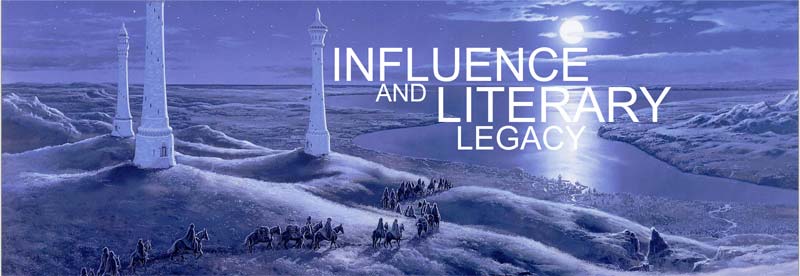
Influence and Literary Legacy
William Shakespeare’s plays were highly popular and they transcended the Elizabethan times to represent all times. His fabulous range of plays affected literature and theatre immensely. The potential of drama expanded dramatically in terms of plot, characterization, language and genre. The play, ‘Romeo and Juliet’ with its tragic ending, paved the way for the topic of tragedy in romance and countless films have been made on this theme. It is an ultimate and beautiful tribute to William Shakespeare that every lover today is addressed as a ‘Romeo’ or ‘Juliet’.
Shakespeare has influenced many great novelists, musicians, artists, painters, dramatists and directors and continues to do so even today. Just as his work is for all times, its influence too will encourage and uplift generations to come. The famed psychoanalyst Sigmund Freud drew his theories of human nature based on the psychology used in Shakespearean plays, especially that of ‘Hamlet’.
Shakespeare’s use of language has even helped shape modern English. Shakespearean expressions like ‘with bated breath’ from ‘The Merchant of Venice’, ‘a foregone conclusion’ from ‘Othello’ and many others have contributed to our lexicon. Even ‘Et, tu, Brute?’ from Julius Caesar is used to express dismay at the treachery of a friend. According to linguist David Crystal, “about 1700 of the words in the full version of the Oxford English Dictionary could be claimed to have been invented by the great Bard of Avon, Shakespeare.”
Shakespeare’s supreme gift is his universality. Poet and critic John Dryden spoke of Shakespeare thus, “Never did any author precipitate himself from such heights of thought to so low expressions, as he often does. He is the very Janus of poets; he wears, almost everywhere, two faces; you have scarce begun to admire the one, ere you despise the other...To begin then with Shakespeare, he was the man who of all modern; and perhaps ancient poets had the largest and most comprehensive soul. All the images of nature were still present to him, and he drew them not laboriously but luckily: When he describes anything, you more than see it, you feel it : he was naturally learned : He needed not the spectacles of books to read nature; he looked inwards, and found her there.”
The legacy of William Shakespeare is his vast body of work, unequalled in Western civilization. His legacy of work in the form of poems, sonnets and plays are not only the monuments of a remarkable genius but also of a remarkable age. The strokes of his genius gave us the masterpieces of the literary world. Since 400 years, his words have echoed across centuries powerfully. To quote the words of this great philosopher from his play ‘Twelfth Night’ (Act II, Scene V):
‘In my stars I am above thee;
But be not afraid of greatness :
some are born great,
some achieve greatness and
some have greatness thrust upon them.’
Be not afraid of greatness...great words! For indeed as some are afraid of failure; some are afraid of success too. Success, fame and adulation may not be everyone’s cup of tea; but as Shakespeare says, some have greatness thrust upon them; be not afraid to drink the cup of success for leaders have to lead and motivate others likewise.
Literature owes a lot to William Shakespeare; this playwright who played his words right, intending to get the right emotions and actions from his characters on stage; and the right reactions from the audience off stage. The rose bud has definitely bloomed into a beautiful flower…a dark pink rose has been named ‘William Shakespeare’ in honour of this celebrated man who has referred to roses more than 50 times in his overall work.
Literature and drama is incomplete without a mention of Shakespeare; his literary talent and creative genius is boundless. He is definitely a star above all who shines his light upon us…for posterity!
Next Biography





